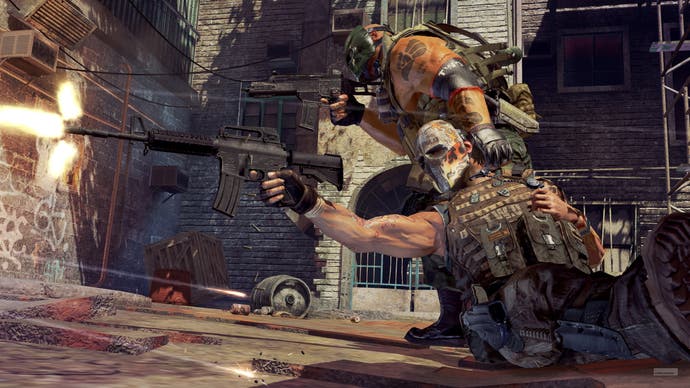Army of Two: The 40th Day
Chasing army.
Army of Two was the videogame equivalent of cow-tipping: it worked better as a co-operative experience, it appealed almost exclusively to the most obnoxious parts of your personality, and when the dust settled you could bump fists, do a little air guitar and then get on with your life safe in the knowledge you'd been engaged in something you weren't entirely proud of.
The sequel is totally different. Salem and Rios have grown up: they've given up working as international mercenaries, invested heavily in green companies, set up a few NGOs, and enrolled in medical school to make up for the many lives they've taken over the last few years. The game is kind of a cross between Trauma Centre and Ecco the Dolphin: you perform miracle surgeries on the elderly and uninsured, while whale song and pan-pipes play in the background, and a stern lady pops up now and then to tell you disquieting facts about global deforestation. Finally, there's a mini-game where you go shopping for organic goats' cheese.
Obviously this is not true - which is just as well, as it sounds rubbish. Army of Two: The 40th Day is broadly more of the same. Set in Shanghai - it's on fire on the menu screens and everything - the story revolves around Rios and Salem taking on a mysterious PMC organisation that appears to be murderously dismantling the city street by street. It's still about guns and explosions and leaving a trail of bodies behind you, there's absolutely no goats' cheese to be found, and the only endangered animals you see are when the fight leads you through a zoo and you can take cover behind a rhino carcass - I would dwell on this bit because I enjoyed it to an almost troubling degree, but sadly we've already picked it over at length in another preview.

There have been subtle changes to the tone, however, if you can use words like 'subtle' and 'tone' in a game in which you play a steel-faced linebacker blowing chunks out of endless militia with a gun that looks like it was designed by Lady GaGa. What kind of changes? Well, for starters, shooting through the first few chapters, as chunks of Shanghai literally come to pieces around you, you spend a lot more time with the masks off - not that you're a chisel-cheekboned art student with pale, watery eyes beneath it.
There are enough little character changes elsewhere to suggest that EA's definitely trying to make Rios and Salem moderately less obnoxious, however: they're caught up in the middle of a battle they didn't help kick off this time, and they're even slightly unhappy when an NPC unnecessarily offs some security guards in the opening moments. Previously, they would have busted open a kegger and chugged brewskis from the poor fellows' hollowed-out skulls.
Within minutes, though, it's business as usual, as weapons are readied - upgrading seems likely to be as kitschly compulsive as ever - the masks are back on, and people are talking about beer o'clock and Steven Seagal while trading hot lead.
And, when all hell breaks loose, you may well find yourself reminded that this was never the most fleet-footed of games. Rios and Salem are bulky characters who move at a ponderous pace, and yet, while the occasional clumsy vault over a wall suggests that the handling is rather iffy at times, the game's steady lope can lend proceedings a weighty and rather satisfying feel.
The real surprise, however, is that despite the grunting jocks in the lead roles Army of Two is often quite a thoughtful experience, with the sequel placing a lot more emphasis on pre-combat, as you scope ahead to the next encounter to work out how to subdue the enemy most effectively. Meanwhile, for the larger arena sections, the Aggro system serves as a reminder that the first outing still had its fair share of nice ideas despite a slightly uneven implementation.


